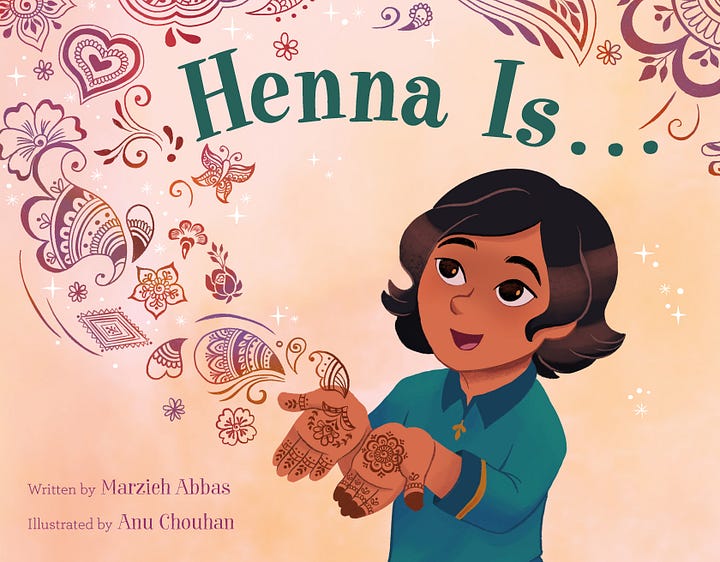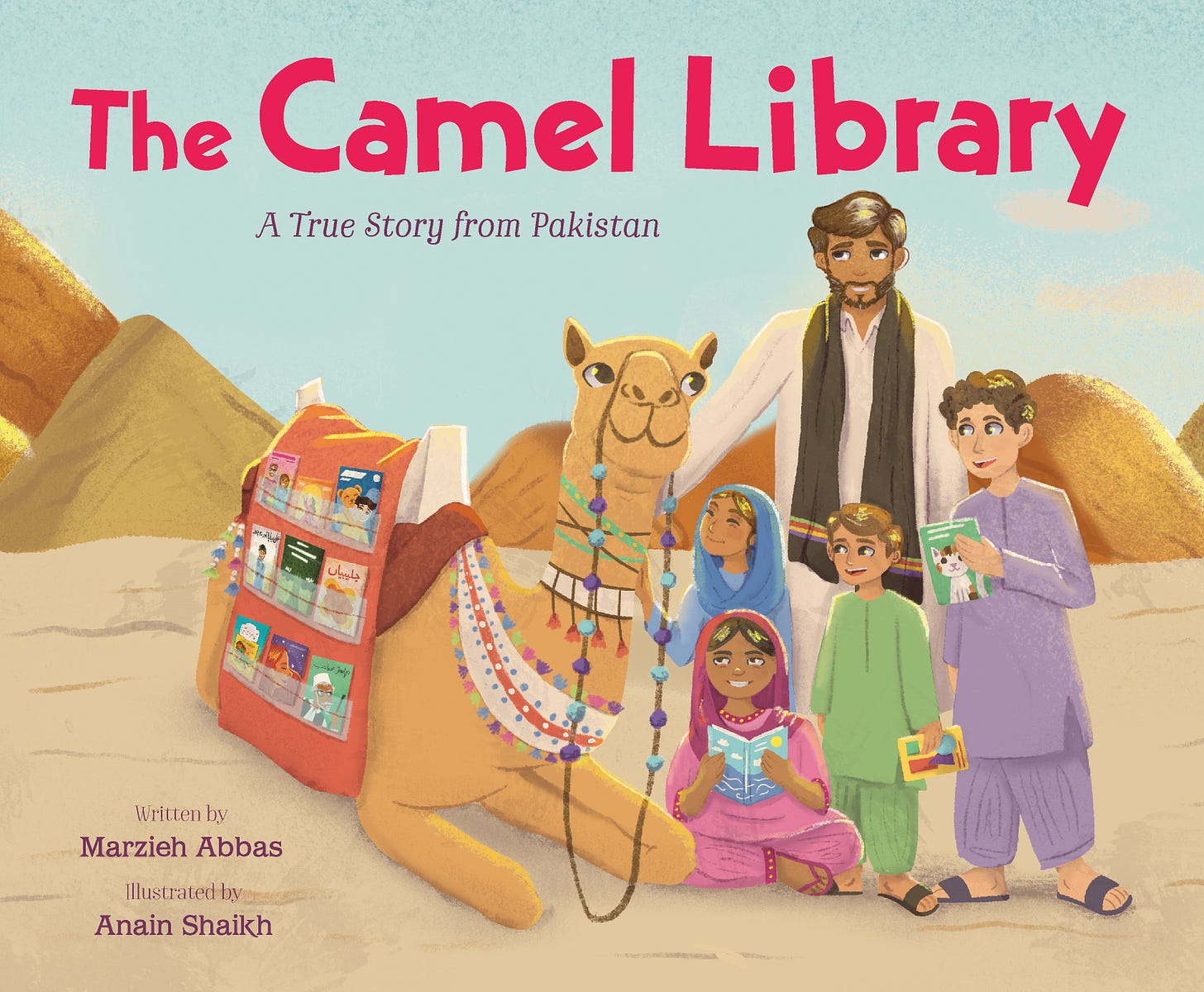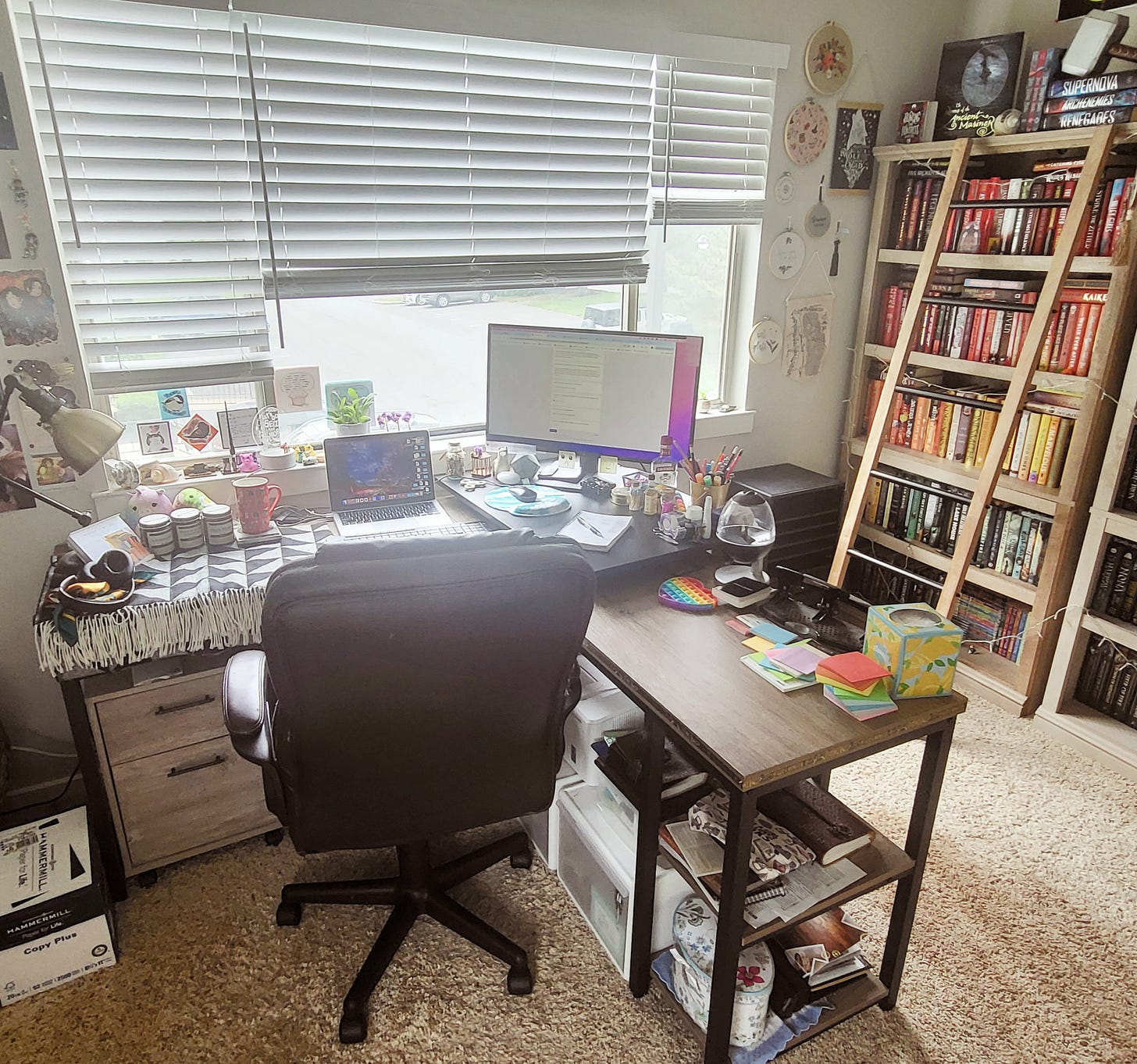Today, as a special treat to my newsletter subscribers, I’m sharing another interview; this time it’s with my awesome Feiwel & Friends (Macmillan Children’s) Editor, Emily Settle.
If you missed it, check out this post for the interview with my literary agent!
Emily was my first editor (for my debut picture book, A Dupatta Is…). She has also edited its companion title, Henna Is…, and my upcoming picture book, A Camel Library (to be released August 2025).


Before the interview, I want to share my first memory of Emily! I was recently agented back in 2020 and had polished my first manuscript draft after signing with my agent (which later went on to become A Dupatta Is…). It had been three weeks the story was out on submission when Emily requested my agent to set up a call.
Whaaaaaaaaat?
After hyper-ventilating and pinching myself to check if this could really be happening, I began thinking of all the things Emily might ask me on call. I wondered if she didn’t like any specific bit, or if she wanted me to revamp my manuscript completely, or *insert all new-author-imposter-syndrome thoughts here*.
When we finally got on call, I remember being completely floored by Emily and her single most important question (after she raved about my manuscript and how much she loved it!). And the question was….
Wait for it…
…
..
.
How do you pronounce your name? I want to make sure I get it right when I pitch your manuscript at our next meeting!
I mean how can one not thank their lucky stars to get to work with such a wonderful editor? And I’ve been super lucky to work with Emily three times!
Interview Time
My questions are in bold below. Emily’s answers are italicized.
Since when have you been in this business/role? Is this what you always wanted to do?
I joined F&F as an intern in Fall 2014, was hired on full-time as the publisher's assistant in June 2015, and I've been here ever since! Most recently I was promoted to Editor in April 2022. I actually didn't even know book publishing was a job until after graduating college! Growing up I changed my mind a lot—I flipped from wanting to be anything from a veterinarian to a helicopter pilot to a tattoo artist. In high school I got into writing, and I ended up going to college for journalism. I worked at a newspaper as a copyeditor for a couple years after graduating, but it turned out I wasn't in love with what I was doing. I thought copyediting books would be more to my taste, so I went to grad school for publishing, and it was during that time when I fell in love with acquisitions / developmental editorial instead.
What would a typical workday look like for you?
I wish I could say I just got to read all day in a comfy chair with a yummy beverage, but sadly that is not the case, haha. I honestly spend most of my days either in meetings, answering emails, or doing paperwork. I think people might be surprised to know just how small a portion of my day-to-day is actually spent reading submissions and editing books!
What's your acquisition process like? Can you share some timelines starting off from the time you receive a query? And what exactly happens in the acquisitions meeting?
I work on books for all ages, but regardless of the genre I'm reading, I'm always looking for something about a submission that feels special, whether it's the overall concept or the main character or the voice. But I also need to have a strong vision for how I would pitch the book and position it in the marketplace—if I don't have that, I wouldn't be setting the book up for success to the best of my ability, which is perhaps the most important part of my job. I read hundreds of submissions a year and I have to pass on most of them, but it's pretty much never because the book is "bad." My most common reason for turning something down is that I just don't feel I'm the right editor for it, either because I don't know how to pitch it or I don't know how to help the author make it better. As an author, you want your editor to have that spark for your project—otherwise they're never going to be able to advocate for you and your book as passionately as they need to. As for timeline, it honestly varies wildly. I personally try to respond to all submissions within 3-4 months, but it could easily take more like 6 if I'm really swamped with other work and just don't have time to read. And then again I've definitely heard of other editors who often respond inside a week, and others that sometimes take a year or more. It really depends on an editor's existing workload and personal time management strategies.
Wow, that insight is invaluable! We often don’t see how much editors are juggling!
Are there any elements in a manuscript that must be 100% perfect before acquiring it? And what are they?
I'm not sure anything can ever be 100% perfect? If anything I think it's usually the imperfections in a submission that draw me to it if it's either something I know how to fix (which gives me that great feeling of "This book needs ME!!!") or it's something that makes it different from other books in the market.
That makes a lot of sense! Before making an offer, do you check out the creator on social media? If yes, does that factor into your offer in anyway?
I do! It's helpful to know if an author has a social media presence yet, and if they do, the kinds of material they post, any mutual connections they have, whether they're particularly good at making videos or graphics or bookish photos, etc. But it's always much less important than the read—if I love a manuscript, it won't matter if the author doesn't have any social media presence, and if I don't love it, it won't matter how big an author's platform already is.
What is the most exciting part about your role?
When I'm working on an edit and I finally figure out exactly what the book needs to be even better! It's like solving a puzzle, and when the pieces click into place it's incredibly satisfying. That and the feeling of being able to give an author the "yes" they've been waiting so long for. :)

I keep hearing the market for picture book biographies, food-themed books, intergenerational bonding books, and graphic novels is saturated. Yet we keep seeing announcements about books in these genres. Is it true that we should be avoiding these topics and are there any other topics, in your view, which are oversaturated in the market?
No way! Some people like to say "Write what you know," but I prefer "Write what you love." It's important not to write to the trends—ex. don't write a vampire romance novel for no other reason than because they're popular—but I believe the opposite is also true. Just because the market might be crowded in a particular genre or topic doesn't mean you shouldn't write one too, especially if that's the story you're most passionate about. Passion isn't something you can fake, and editors (and readers!) can tell when a writer doesn't actually feel that personal connection to their own work. And if the author doesn't really care about the story, why should the reader? True, if there are a lot of competitive titles out there already, there's always a chance you may have more challenges to overcome in order to sell and publish that book successfully, but the market is always changing. An area that is saturated now might actually be lacking in one to two years from now when your book actually comes out. It's pretty impossible to predict, so I would never encourage an author to give up on a story they care about just because there are similar titles that already exist.
What's the most awkward (if you're okay with sharing) or funny encounter following someone finding out about your role in publishing?
When my nephew was around five years old apparently, he told his friends at school that I worked in a "book factory"! XD
What story element makes you immediately fall in love with a manuscript?
It can be something different for every book! For me it's usually either a particular character or the author's voice (or a combination of the two). But it can be any singular element that feels special and makes me care about the story—anything from a creative piece of world-building to a cool magic system to a particularly adorable animal sidekick.
Do pre-orders matter? What are considered good pre-sales?
The short answer is yes, they matter. But the long answer, as with most things in publishing, is "it depends on the book." Preorders are very useful because it can give booksellers an early indication of consumer interest in a title, and that in turn will help them decide how many copies they want to take up front for their account. The more copies they take, the more visibility in stores the book will have, and the bigger the first print run will be. But it depends—preorders aren't usually a must-have for the average picture book, for instance, but they can definitely have a huge impact on high-profile / celebrity picture books. Accounts will still support a novel if they love the read even if there aren't a lot of preorders, but healthy preorders will let them know they need to be paying closer attention to one they may have overlooked for whatever reason. Preorders are also a huge factor in what books make the weekly bestseller lists, so if being a bestseller is a priority for you as an author and/or for your publisher, then yes, preorders absolutely do matter. While not having many preorders probably won't be an indicator of impending disaster for most authors, having even a few will only ever help you and your book. They never hurt!
Once a book is published, do you collaborate with the author to decide which events and engagements to book for the author?
As their editor, not usually. Most of the strategizing about what events or promo an author should do or wants to do happens with their assigned publicist and/or marketer. I can certainly make recommendations to the publicist based on what I know about the author and the book—"She lives in Chicago so we should pitch her for a panel at C2E2" or "This book has awards potential so we should make sure to have ARCs at all the major librarian conferences" etc.—but they're the ones who ultimately make the marketing plan and submit any pitches.
If an author you have worked with sends you another manuscript, do you look at previous sales figures for their published books? If yes, what digits are considered "good"?
Yes, previous sales track is often an important factor in whether I'm able to acquire a new book from an existing author. There isn't a set number of sales that's good for every book, but the individual advance and other expenses is a pretty significant factor—meaning the more we spent on a book, the more copies it needs to have sold in order for us to justify buying a second, since it would be reasonable to expect we'd have the same level of expenses.
What elements in an acquired manuscript do you find more commonly need tweaking during the editorial process?
For picture books, it's usually making sure the story has sufficient emotional depth and kid-appeal. Since you've only got like 150-300 words to work with, every single one of them needs to be perfect. (NEVER let anyone tell you that writing picture books is easy!) For novels, there's usually either a character arc that doesn't feel quite right, or some kind of plot element that's either missing or feels superfluous. Maybe there's a redemption arc that doesn't feel quite earned or a scene that's missing that would've explained why what happened happened. Could be anything! I personally am a bit of an impatient reader, so my editing style often emphasizes pacing—making sure the story keeps moving forward at all times, even during quieter moments. Every writing choice made in the book should be with the purpose of moving forward.
What characterizes a book as a "success"?
Sorry if I sound like a broken record, but it depends! :) Usually for the publisher, a book would be considered successful if it results in a positive return on investment (the author's / illustrator's advance earns out, the profits outweigh the expenses / losses, etc.). But those aren't necessarily the only indicators of success.
What do you do when a book you edited and published doesn't sell well?
Cry, mostly. T^T But sadly it does happen, and more often than you might think. The cruel reality of publishing is that you can do literally everything right—tight storyline, beautiful cover, robust marketing plan, enthusiastic and involved author, sales support—and a book will still underperform. And pretty much never for an explainable reason!
Any words of advice for aspiring, unpublished, un-agented authors and illustrators?
1.) Decide what you want out of your publishing experience early on. Every author gets to decide for themselves what "success" looks like to them—it could be getting published by a particular house, earning enough money to be able to quit your day job, winning an award, attending a particular event or festival as a guest author, anything that's important to you. Not only will having that picture of what YOUR success looks like help you to not try to compare your journey to someone else's, but it's also extremely helpful for both your agent and publisher to know what your expectations and hopes are going in. 2.) Do ALL the research. Look at what kinds of books different houses are publishing, and publishing well. Speak to an agent's other clients and an editor's other authors before signing with them. Meet other authors, whether aspiring or published a hundred times, and listen to the whisper networks. Ask EVERY question you can think of! 3.) Read absolutely everything you can find! Read across genres and age groups and formats, not just the ones you prefer to write in. And most importantly, read diversely and inclusively. Step outside your comfort zone and your personal worldview as often and enthusiastically as you possibly can.
Any resources you would recommend to someone looking to improve their craft?
Since I'm not a writer myself I can't personally testify to these books' usefulness, but I've heard good thinks about both SAVE THE CAT by Blake Snyder (and Jessica Brody did a version specifically for novels) and BIRD BY BIRD by Anne Lamott. But I think the two most essential things you can do to improve your writing is to KEEP writing, and read read read read read.
What's your favorite 'desk snack' (if you have one)?
I don't feel fully human until I have my coffee—always hot, never iced, with a truly reprehensible amount of vanilla creamer.
Wow! Thank you for inspiring and educating us through this super insightful interview, Emily.
I love seeing workspaces, and Emily was kind enough to share hers! (*swoooooooooon*)
Everything looks so organized and even just looking at it inspires me to jump into a focused work session! I’m especially in love with the ladder and the color-coded bookshelf, and the wall art, and pretty much everything!
Let me know your thoughts and what you’d like to learn more about!







Very insightful interview into the day-to-day of an editor! Would love to one day be picked up by such an industrious and thoughtful individual.